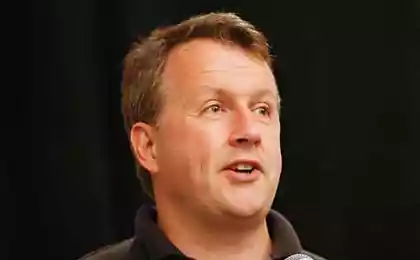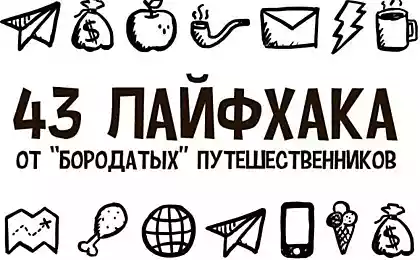523
Work slower: 10 paradoxical rules that will help to bring the case to the end
How not to go astray and to finish a big project? New post known blogger and writer, Chris Bailey, who for several years studying the techniques of the productive life.

A couple of weeks ago I sent the manuscript to the publisher of his book — 81 of 302 words. I locked myself in the office for six months, almost nothing I wrote in my blog and a little something else worked — and now the project is over, and I'm damn proud of what I did. Perhaps the most interesting thing about the book is that she in a sense has created herself. While writing I have used all the techniques of performance, about which I tell. And thanks to that I finished the project six months before deadline. It is worth noting that I wrote it from scratch and didn't use any posts from your blog. Here are the 10 main lessons I derived from this project.
1. Disconnect from the Internet
If I wasn't disconnected from the network while writing the book, I'm pretty sure that I would write her still. Tim Pychyl, which explores motivation and procrastination for 20 years, conducted an interesting study of performance. He studied how much time the average person spends on procrastination, when connected to the Internet, and revealed something amazing: the average person 47% of time spent online, procrastinate. And this was before the rise of social networking! After reading this study, I began to disconnect from the Internet.
Of course, the Internet is important and necessary for work, and impossible to disconnect from it altogether. But as soon as I needed to dive into something important, I turn it off. This allowed me to return about half of the time spent and work smarter. 90% of the books I've written, disconnected from the network — although the writing and demanded a lot of research. When you next need to focus on something important, try to completely disable the Internet. You will be surprised how more efficient you will work.
2. It is assumed obstacles
When you undertake a big project or trying to seriously change your life and work, you get stuck. Performance is often the process of understanding your limitations, and the ability to foresee the obstacles will help you prepare for them to bypass before they occur. Towards the end of the book, when I decided to finish it quick, I'm two months wrote an average of one thousand words a day. This ultraproductive period to anticipate the inconvenience of travel, family obligations, meetings and other work commitments — was crucial. Every week I looked for another week ahead to see what obstacles I have to jump, and came up with a plan that allows them to get around and still do their daily norm.
3. Organize the space around the most important tasks and projects
Urbanists say that the smooth flow on the freeway does not depend on how fast the machine is and how much between them is free space. The same tasks that we do in work and everyday life. One thing to know which ones are most important, and quite another to be able to create around them so you don't feel overwhelmed. So you can devote more time, attention and energy to work on them. Do the most productive people, and first of all, so I was able to quickly dive into the work on the book. In your work you are responsible for dozens of tasks, but the main result and the main value for your employer (even if you do) bring only a few of them. When I wrote my book The Productivity Project, I came to the conclusion that in my life there are only three kinds of commitments that have the greatest impact.
Here they are in order:
— Writing book
— Public speaking
— Writing articles for my website
Everything else — meetings, correspondence, social network, etc. — only supports my work, so I came up with a plan that helps you to spend less time on these tasks and eliminate them from my schedule or to delegate so I have more time on the three most important things to do. The most productive people not only know how to step back and see where the most their main result, they also make a special effort to delegate, eliminate or compress everything else.
4. Plan idle time
Every day your brain regularly switches between the two modes: in one, he wanders where he likes, and the other focuses intensely on something. For example, when you take a shower, usually in the brain vagus mode, it jump to different thoughts, and as you read this article, he probably focused. However, we perform a "vagus" mode is less time — we have more and more load myself busy and grab a million things at once. And it's sad because, as multiple studies have shown that spending time in a dreamy meditation is helpful for creativity, it helps to solve complex problems, invent new ideas and reduces stress.
Surely you come to mind great ideas during shower and it is unlikely — at the moment when you're buried in your smartphone. I experienced it myself during the writing of the book. If you spend too much time multitasking or focused work, let the brain relax.
Go to an art gallery, walk in nature, take a very long shower it's time for dreams. It is a worthy investment.
5. Make time for reflection on their achievements
Large and long projects like writing a book differ from other tasks that they give much less feedback. So, sometimes, they are less motivated and are more difficult — although they are definitely worth the effort.
Me the most out of a ritual — once a week, I was looking through the list of his achievements. Performance is not to produce as much as possible, it means to achieve as much as possible. Keep a list of such achievements, and if you times in a week to study and ponder it, it will accelerate your movement to victory. This is especially important because the more productively you work, the less time you have to stop and praise yourself. The more you achieve, the more you are busy and the less time you have to enjoy the results of their performance. So spend at least a few minutes a week on it.
6. Search for people on whom you can rely
Insanely difficult to write a book or perform another equally challenging project without the support of many other people. Fortunately, I had this support. I'd be lying if I said that while working on the book, I was the perfect friend/brother/boyfriend/blogger/etc., because the book required more time, attention and energy than anything else. But every minute that I invested in this period in relationship with people, brought me in response a lot more support and happiness. This greatly facilitated the work, especially because I have a natural tendency to try to do everything myself. But the more I struggled with this tendency, the happier and satisfactorily did my work on the project.
Whatever you do, the presence of people on whom you can rely and who can rely on you, it is extremely important not only for productive work, but also to save my sanity.
7. In large projects put a lot of small goals
Go from regular blog posts to the writing of the book was weird. It is a completely different activity: it requires juggling a lot of research, facts and stories, this process involved more people, and you need to give the case more attention if you want to withdraw real connection between the ideas about which you write. But as I said, writing more books and less stimulating, because you get much less feedback. Realizing this, I decided to structure the work — ask yourself lots of small goals and milestones. This allowed me to plan and move in the right direction, and most importantly — to see the big picture of the project.
8. Large projects have large costs but they are worth it
The more important a project for me, the more time, attention and energy I try to commit. And although there are ways to find more energy and better focus, to find more time is impossible — you have to spend less time on other commitments. And I had to live with the costs — I had less time and attention on is important to me classes and things. The focus here is to understand these costs in advance. Therefore, it is important to step back a bit and think twice about whether or not you spend your time, attention and energy as you want — especially before you undertake a new business, project or move on to a new job.
9. Curiosity ruled
When the world hangs over us, more and more cases, curiosity may seem more a luxury than a necessity. But I think the opposite. Studying the life of the most productive people in history, I always notice the same thing: the most successful people are those who can see connections between things and the overall picture. And for that you need to learn as many details as possible — new ideas, impressions, dialogues, errors, and opinions. And it requires curiosity. Working on the book, I allowed myself to continue to learn new things about productivity, explore new topics, experiment. I also allowed myself to dive deeper into the lessons, I brought in the course of the project, and even more fanatet from this topic. In the end, thanks to this I could write a worthy book because it fit more ideas and connections. And I strengthened my writing skills because I was curious to how better to write. Curiosity makes people more successful and more productive. I can't stand the saying "curiosity killed the cat." This is nonsense: everything I learned about led performance and your experience disproves it.
10. Work slower
Perhaps the most curious thing that I discovered during work on a book — the slower I write during the day, the more words I have ready for the end of the day. When I first started working, I barely managed to squeeze out a few hundred words a day. Every day I rushed to work on another Chapter, trying to give them more vigorously, and as a result lost control over the process. But then I slowed down and it turned out that by the end of the day the result rolls over. This, of course, strange and non-obvious tactic, but for me it's a welcome one. When you slow down, it allows you to work more meaningfully and purposefully gives space and opportunity to cultivate their productivity, helps deeper to think about all you have to do. The slower I wrote the book and than slowly worked on other tasks (presentations and advising, for example) at this time, the more I was able to make it to the end of the day, because as much wiser I was able to work.
The most productive people — not those who work harder and faster only, and those who work intelligently and purposefully.
P. S. And remember, just changing your mind - together we change the world! ©
Source: ideanomics.ru/?p=4393

A couple of weeks ago I sent the manuscript to the publisher of his book — 81 of 302 words. I locked myself in the office for six months, almost nothing I wrote in my blog and a little something else worked — and now the project is over, and I'm damn proud of what I did. Perhaps the most interesting thing about the book is that she in a sense has created herself. While writing I have used all the techniques of performance, about which I tell. And thanks to that I finished the project six months before deadline. It is worth noting that I wrote it from scratch and didn't use any posts from your blog. Here are the 10 main lessons I derived from this project.
1. Disconnect from the Internet
If I wasn't disconnected from the network while writing the book, I'm pretty sure that I would write her still. Tim Pychyl, which explores motivation and procrastination for 20 years, conducted an interesting study of performance. He studied how much time the average person spends on procrastination, when connected to the Internet, and revealed something amazing: the average person 47% of time spent online, procrastinate. And this was before the rise of social networking! After reading this study, I began to disconnect from the Internet.
Of course, the Internet is important and necessary for work, and impossible to disconnect from it altogether. But as soon as I needed to dive into something important, I turn it off. This allowed me to return about half of the time spent and work smarter. 90% of the books I've written, disconnected from the network — although the writing and demanded a lot of research. When you next need to focus on something important, try to completely disable the Internet. You will be surprised how more efficient you will work.
2. It is assumed obstacles
When you undertake a big project or trying to seriously change your life and work, you get stuck. Performance is often the process of understanding your limitations, and the ability to foresee the obstacles will help you prepare for them to bypass before they occur. Towards the end of the book, when I decided to finish it quick, I'm two months wrote an average of one thousand words a day. This ultraproductive period to anticipate the inconvenience of travel, family obligations, meetings and other work commitments — was crucial. Every week I looked for another week ahead to see what obstacles I have to jump, and came up with a plan that allows them to get around and still do their daily norm.
3. Organize the space around the most important tasks and projects
Urbanists say that the smooth flow on the freeway does not depend on how fast the machine is and how much between them is free space. The same tasks that we do in work and everyday life. One thing to know which ones are most important, and quite another to be able to create around them so you don't feel overwhelmed. So you can devote more time, attention and energy to work on them. Do the most productive people, and first of all, so I was able to quickly dive into the work on the book. In your work you are responsible for dozens of tasks, but the main result and the main value for your employer (even if you do) bring only a few of them. When I wrote my book The Productivity Project, I came to the conclusion that in my life there are only three kinds of commitments that have the greatest impact.
Here they are in order:
— Writing book
— Public speaking
— Writing articles for my website
Everything else — meetings, correspondence, social network, etc. — only supports my work, so I came up with a plan that helps you to spend less time on these tasks and eliminate them from my schedule or to delegate so I have more time on the three most important things to do. The most productive people not only know how to step back and see where the most their main result, they also make a special effort to delegate, eliminate or compress everything else.
4. Plan idle time
Every day your brain regularly switches between the two modes: in one, he wanders where he likes, and the other focuses intensely on something. For example, when you take a shower, usually in the brain vagus mode, it jump to different thoughts, and as you read this article, he probably focused. However, we perform a "vagus" mode is less time — we have more and more load myself busy and grab a million things at once. And it's sad because, as multiple studies have shown that spending time in a dreamy meditation is helpful for creativity, it helps to solve complex problems, invent new ideas and reduces stress.
Surely you come to mind great ideas during shower and it is unlikely — at the moment when you're buried in your smartphone. I experienced it myself during the writing of the book. If you spend too much time multitasking or focused work, let the brain relax.
Go to an art gallery, walk in nature, take a very long shower it's time for dreams. It is a worthy investment.
5. Make time for reflection on their achievements
Large and long projects like writing a book differ from other tasks that they give much less feedback. So, sometimes, they are less motivated and are more difficult — although they are definitely worth the effort.
Me the most out of a ritual — once a week, I was looking through the list of his achievements. Performance is not to produce as much as possible, it means to achieve as much as possible. Keep a list of such achievements, and if you times in a week to study and ponder it, it will accelerate your movement to victory. This is especially important because the more productively you work, the less time you have to stop and praise yourself. The more you achieve, the more you are busy and the less time you have to enjoy the results of their performance. So spend at least a few minutes a week on it.
6. Search for people on whom you can rely
Insanely difficult to write a book or perform another equally challenging project without the support of many other people. Fortunately, I had this support. I'd be lying if I said that while working on the book, I was the perfect friend/brother/boyfriend/blogger/etc., because the book required more time, attention and energy than anything else. But every minute that I invested in this period in relationship with people, brought me in response a lot more support and happiness. This greatly facilitated the work, especially because I have a natural tendency to try to do everything myself. But the more I struggled with this tendency, the happier and satisfactorily did my work on the project.
Whatever you do, the presence of people on whom you can rely and who can rely on you, it is extremely important not only for productive work, but also to save my sanity.
7. In large projects put a lot of small goals
Go from regular blog posts to the writing of the book was weird. It is a completely different activity: it requires juggling a lot of research, facts and stories, this process involved more people, and you need to give the case more attention if you want to withdraw real connection between the ideas about which you write. But as I said, writing more books and less stimulating, because you get much less feedback. Realizing this, I decided to structure the work — ask yourself lots of small goals and milestones. This allowed me to plan and move in the right direction, and most importantly — to see the big picture of the project.
8. Large projects have large costs but they are worth it
The more important a project for me, the more time, attention and energy I try to commit. And although there are ways to find more energy and better focus, to find more time is impossible — you have to spend less time on other commitments. And I had to live with the costs — I had less time and attention on is important to me classes and things. The focus here is to understand these costs in advance. Therefore, it is important to step back a bit and think twice about whether or not you spend your time, attention and energy as you want — especially before you undertake a new business, project or move on to a new job.
9. Curiosity ruled
When the world hangs over us, more and more cases, curiosity may seem more a luxury than a necessity. But I think the opposite. Studying the life of the most productive people in history, I always notice the same thing: the most successful people are those who can see connections between things and the overall picture. And for that you need to learn as many details as possible — new ideas, impressions, dialogues, errors, and opinions. And it requires curiosity. Working on the book, I allowed myself to continue to learn new things about productivity, explore new topics, experiment. I also allowed myself to dive deeper into the lessons, I brought in the course of the project, and even more fanatet from this topic. In the end, thanks to this I could write a worthy book because it fit more ideas and connections. And I strengthened my writing skills because I was curious to how better to write. Curiosity makes people more successful and more productive. I can't stand the saying "curiosity killed the cat." This is nonsense: everything I learned about led performance and your experience disproves it.
10. Work slower
Perhaps the most curious thing that I discovered during work on a book — the slower I write during the day, the more words I have ready for the end of the day. When I first started working, I barely managed to squeeze out a few hundred words a day. Every day I rushed to work on another Chapter, trying to give them more vigorously, and as a result lost control over the process. But then I slowed down and it turned out that by the end of the day the result rolls over. This, of course, strange and non-obvious tactic, but for me it's a welcome one. When you slow down, it allows you to work more meaningfully and purposefully gives space and opportunity to cultivate their productivity, helps deeper to think about all you have to do. The slower I wrote the book and than slowly worked on other tasks (presentations and advising, for example) at this time, the more I was able to make it to the end of the day, because as much wiser I was able to work.
The most productive people — not those who work harder and faster only, and those who work intelligently and purposefully.
P. S. And remember, just changing your mind - together we change the world! ©
Source: ideanomics.ru/?p=4393























